Stills • Thoughts • Spoilers https://linktr.ee/the_anthrotographer
Don't wanna be here? Send us removal request.
Text
#movie review#movies#film#horror#nosferatu#1920s#germany#vampire aesthetic#film photography#occult#vampires#gothic
1 note
·
View note
Text
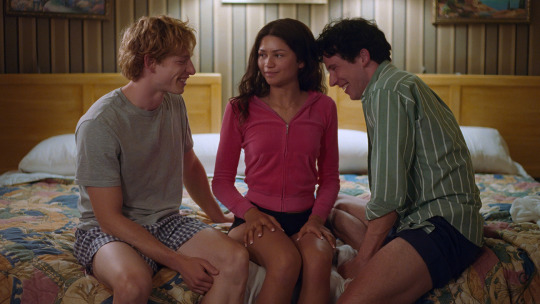
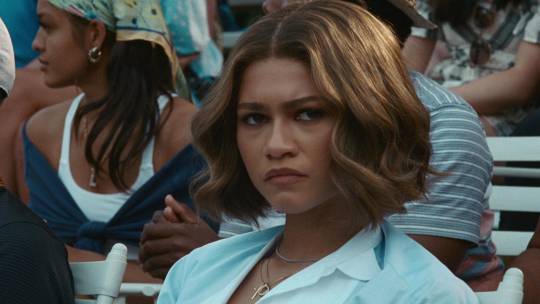
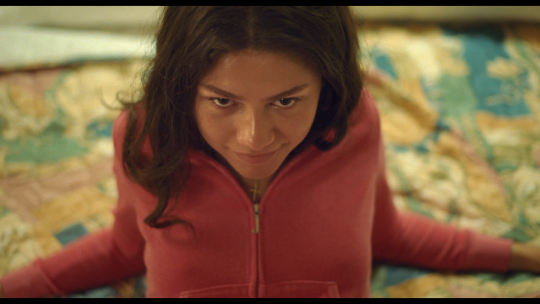
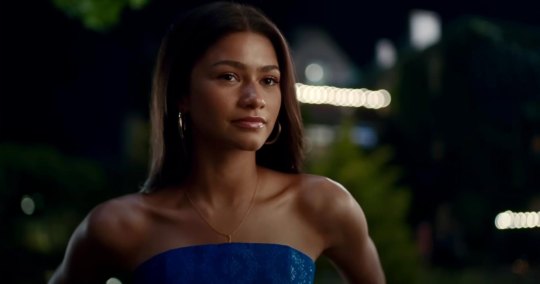
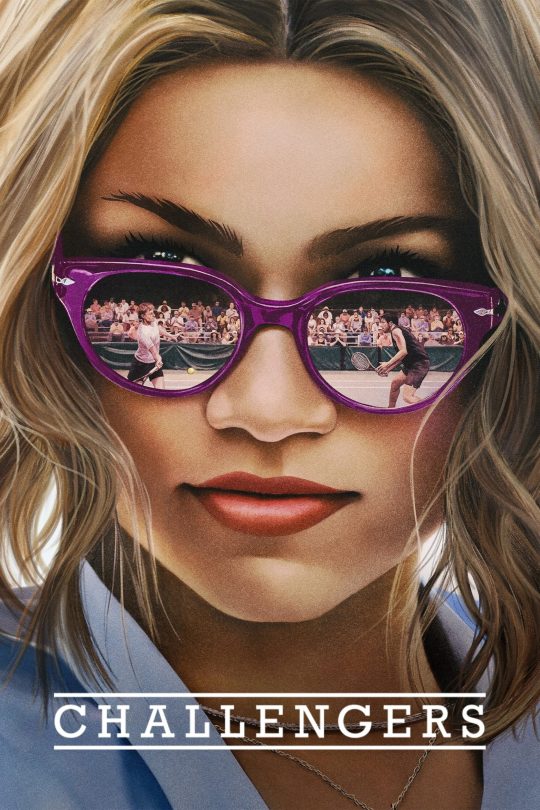
Challengers (2024) | A review w/ spoilers*
Tumblr is not going to like my review, I already know. I acknowledge this movie wasn't made for me, but I feel I give credit where it's due.
Last night I had a staggering movie going experience. I felt like I was being sold a lie a minute sitting through the agonizing commercials, the movie previews, and till the end of Challengers. Back to back promos for military branches, painting them as organizations of peace and innovation (a rally during war time). I understand there’s nothing new about that experience. Consumerism and propaganda tactics have a long tradition at the cinema. We’ve been advertised a false reality for so long it’s hard to think about our world without using the images fed to us to line that canvas. Take how modern horror treats rural living. It’s very common to see (in fact I saw) a movie trailer where a young couple vacations in a secluded part of the country to get away from it all. The idea of ruralism as a peaceful alternative to stressful urban living is benign and actually has some merit to think about in a country as urbanized and unhappy as ours. Yet the common movie trope is that there are evil forces lurking in the dark outskirts, that living ‘out there’ turns people into kooks or murderous cultists. One movie by itself with this premise can be harmless, but within a whole genre that trends this way it feels insidious. Almost like we are supposed to all fear each other. Challengers is another example of a genre movie that warps human reality into a lifeless opportunity to sell things.
When a movie feels more like a commercial or a music video then why even bother with the movie going experience. The distinguishers between television and film are fading away over time. In one particularly unabashed scene we cut between three different product placements for Coke, Adidas, and the U.S. Open. It was shameless, the way Josh O’Connor was most likely told to hold that CocaCola label perfectly centered in the frame. Those three brands are far from the only ones displayed. Tennis, and sports events in general, flash a ton of advertising so I understand that the film’s stuck in that universe. Still there are ways to artfully sidestep brazen product placement.
I don’t want to spend much time trying to analyze the relationship between Tashi, Art and Patrick. The film doesn’t give you enough about why these three are fatefully attached to each other besides vapid attractions. Yes all three are enamored by one another but what’s the motivation to stay in this toxic ménage à trois dynamic for so long? Zendaya plays Tashi, a master manipulator trying to mold her husband Art Donaldson into the star tennis player she was supposed to be before her injury. And her “little white boys” Art and Patrick feel like pawns that are content to be pawns. Men who don’t have any freewill and are solely motivated by their lust for this supermodel of a woman. In a way I don’t blame them. My disconnect comes because there’s a lack of depth with the characters and their relationships. Each of them seems to have a singular focus; Tashi wants vicarious glory through Art, Art wants to be loved, and Patrick wants Art’s life. But there is no depth to the desires. Time is never spent on why Tashi loves tennis more than people or why Art and Pat let their, supposedly strong bond, get broken so easily by a “home wrecker” that forecasted her own home wrecking. And look, as a seductive art piece it succeeds, for the most part, but as a story about real people it reduces its characters to their base desires while pretending they are complex. Maybe I don’t understand Romance—as I’ve been told. I am content to treat it as just a romantic fantasy and give it credit for being hot, but it was also a long drawn out tease.
There was no reason for this experience to be more than two hours long! Half of it was in never ending slow-mo where I felt like the same tennis ball was being served for half an hour. The dreaded slow motion, which can be good for a sporty movie to capture athletic movements and build suspense, but here it was overused to a point where it left us thinking “get on with it already”. Thank goodness some of my theater neighbors were also moaning about this because I felt alone, trapped in a drugged fugue state. So much of the film was disorienting. For a period you are meant to feel like a tennis ball being battered around through the camera. Editing wise this movie had the same problem that so many modern movies have; death from a thousand cuts. And the slowly unraveling chopped timeline executed so many arbitrary flashbacks and flash forwards. Eight weeks before, two days forward, then a five year flashback, all when you could tell this story sequentially with similar suspense building and less confusion.
Seeing this movie was a spur of the moment, going in blind experience. I know now that I was not the target audience. Today I mentioned it to a friend and he ended up watching the trailer. The text I got back: “looked like a bit of a teenager movie”. I don’t mean to spoil the enjoyment for anyone with this review. From a certain angle I did have fun with Challengers. Sometimes simply devouring some eye candy is what the mood demands.
If you found my writing at all interesting please visit and follow it on Substack!
#movie review#movies#film#movie poster#film review#zendaya#zenday coleman#josh o'connor#mike faist#luca guadagnino#challengers#challengers 2024#romance#tennis#propaganda#anthrotographer
11 notes
·
View notes
Text
1 note
·
View note
Text
Review of 'The Time Machine' by H.G. Wells
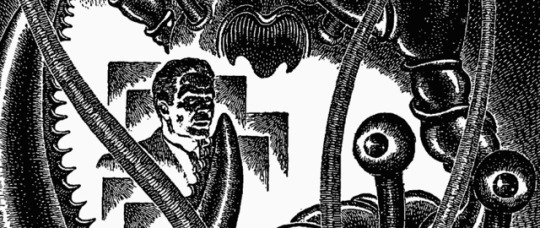
The stories of H.G.Wells are rich and captivating worlds where he makes the unfathomable seem plausible. Wells uses concepts from the sciences readily in his writing as a base of reality. His protagonists tend to be inquisitive types that posit questions about the state of the world, often giving and testing their hypotheses along a surreal adventure. In The Time Machine our protagonist is simply and ambiguously labeled the Time Traveler. He has just transformed physics forever by creating a vehicle that can fold and traverse spacetime. Now he aims to demonstrate to his civilized friends his unbelievable achievement. In a way this demonstration is both a primer for them and a reassurance for himself that he is not in a fantasy.
“Can an instantaneous cube exist?”
This is a question the Time Traveler asks his dinner party audience in order to introduce the concept of Time as the 4th dimension. He claims you need “duration” for anything to truly exist. If a cube only exists for an imperceptible instant then did it really exist? It’s a question that provokes a bunch of thoughts. How long is an instant? If an instant is measurable then the cube did exist for a time, no? But without the evidence of creation or decay of the cube how can we be certain that it existed? This question is a seemingly untestable hypothetical.
“But you are wrong to say that we cannot move about in Time. For instance, if I am recalling an incident very vividly I go back to the instant of its occurrence: I become absent-minded, as you say. I jump back for a moment. Of course we have no means of staying back for any length of Time, any more than a savage or an animal has of staying six feet above the ground. But a civilized man is better off than the savage in this respect. He can go up against gravitation in a balloon, and why should he not hope that ultimately he may be able to stop or accelerate his drift along the Time-Dimension, or even turn about and travel the other way?"
The idea of memories being a way to time travel brings into thought a swell of philosophy. Is time really just a figment of consciousness. A way for humans to make sense of the world, to traverse it, to learn from it. Many scientists seem to think so (1). A mind altering realization that I can’t truly grasp fully. But what if in a way thinking of time as just a construct of the mind might reveal an ultimate interpretation of this extraordinary tale that’s being told. I’m sure it’s read that way by some.
Also, ‘if ever a creature could figure out time travel it’s humans’, believes the Time Traveler. His distinction between “civilized” man and a “savage” is problematic to say the least, but we’ll revisit that later because it has major bearing on how our protagonist sees the world.
Distinguishing the 4th dimension of Time as another measure of existence (like the 3 Euclidian measures of height, length and width) is a way for the reader, and the dinner party audience, to conceptualize it as a plane that we can move along. Today scientists still haven’t cracked the code of time travel and some contest Time being the 4th dimension at all. (2)(3)
“The peculiar risk lay in the possibility of my finding some substance in the space which I, or the machine, occupied. So long as I travelled at a high velocity through time, this scarcely mattered: I was, so to speak, attenuated— was slipping like a vapour through the interstices of intervening substances! But to come to a stop involved the jamming of myself, molecule by molecule, into whatever lay in my way: meant bringing my atoms into such intimate contact with those of the obstacle that a profound chemical reaction-possibly a far-reaching explosion-would result, and blow myself and my apparatus out of all possible dimensions into the Unknown. This possibility had occurred to me again and again while I was making the machine”
Here the Time Traveler is describing his first, future time warp. Imagine flying through time and seeing your home, and world as you knew it, vanish. It reads as an incredibly disorienting experience. And this possibility of stopping at the wrong time and fusing with some obstruction in his position seems like a massive red flag. The logic that Wells presents shows how deep he went in imagining what time travel would be like. He intuitively analyzed many of the potential pitfalls that could occur.
“What might appear when that hazy curtain was altogether withdrawn? What might not have happened to men? What if cruelty had grown into a common passion? What if in this interval the race had lost its manliness and had developed into something inhuman, unsympathetic, and overwhelmingly powerful? I might seem some old-world savage animal, only the more dreadful and disgusting for our common likeness, a foul creature to be incontinently slain.”
And here begins the traveler’s speculative musings on the futurity of man. I enjoy this aspect of the story in particular because of my own fascination with humanity’s future. Here he contemplates what we might turn into. Projecting forward, knowing that our species has a long history of warring against each other, it would be a safe bet that that would continue. It has for some time. But is it intrinsic to what our species is? One read of this quote is that the Traveler thinks cruelty is currently uncommon, and that we might devolve into being cruel creatures. Wells and the Time Traveler are from England. They grew up as citizens of a colonial power, used to a culture of cruel conquest. They are also used to thinking that to maintain their civilization some other peoples need to be on the sacrificial end. This dichotomic mentality deems all other lives expendable on their route to control, and maybe this line of thinking from the Time Traveler is an example of that mentality bleeding over into his predictions. When I read that last sentence of the quote I couldn’t help but think about the British colonist’s warped rationale for incontinently slaying the indigenous peoples of Australia or N. America. A bit of projection maybe?
Now he’ll actually stop at a time, far different than his own. A moment in time where mother nature’s diversity has been restored, while humanity is “upon the wane.”
“You see I had always anticipated that the people of the year Eight Hundred and Two Thousand odd would be incredibly in front of us in knowledge, art, everything. Then one of them suddenly asked me a question that showed him to be on the intellectual level of one of our five-year-old children- asked me, in fact, if I had come from the sun in a thunderstorm! … A flow of disappointment rushed across my mind. For a moment I felt that I had built the Time Machine in vain.”
The anticipation of a progressive revolution speaks to his belief in humanity’s continued evolution (whatever that means). It can be coming from a societally egoistic perspective or a self-ego perspective, being that the Time Traveler can see himself as a revolutionary inventor. Thinking that we will always be progressing doesn’t take into account the pitfalls that come from our expansion.
I think that Wells actually does a nice job in creating this character that doesn’t get lost in himself too much, and tends to stick to ideas about the world. He rolls with the punches of having some of his hypotheses turn out wrong. He is human of course and does have brief episodes of existential dread, but the plot is more important than character to this story. In a way it is more captivating that way. The protagonist can be an amorphous entity for the reader to plop themselves into to experience the imaginary world of time travel.
Meeting the Eloi people in this moment shatters the glass of that societal ego. Our traveler was so looking forward to ascertaining the future’s wisdom. My interpretation is that The Time Machine is unwittingly prophetic in distinct ways. And that the future’s wisdom is revealed. More to come.
“For the first time I began to realise an odd consequence of the social effort in which we are at present engaged. And yet, come to think, it is a logical consequence enough. Strength is the outcome of need; security sets a premium on feebleness. The work of ameliorating the conditions of life-the true civilising process that makes life more and more secure-had gone steadily on to a climax. One triumph of a united humanity over Nature had followed another. Things that are now mere dreams had become projects deliberately put in hand and carried forward. And the harvest was what I saw!” “Social triumphs, too, had been effected. I saw mankind housed in splendid shelters, gloriously clothed, and as yet I had found them engaged in no toil. There were no signs of struggle, neither social nor economical struggle. The shop, the advertisement, traffic, all that commerce which constitutes the body of our world, was gone. It was natural on that golden evening that I should jump at the idea of a social paradise.”
He finds a world where the small population of Eloi are thought to be our last descendants. There is very little modern architecture left, and even less not fully claimed back by vegetation. Wondering why there are so few people left and why no one is doing any work, he speculates that it might be the logical order of a fully realized civilized world. A utopia of sorts where life is so easy that we have adjusted to a life of physical and mental sloth. The idea of the exponentially increasing civilizing process is a prevalent idea in present day thought. First it assumes that civility = collective good, when practically speaking only a subset of our population benefits from this modernity while the other part either toils to maintain it or gets excluded from it. Which brings up another variable when projecting forward, which is; what happens to class and human exploitation. The trend of modernity, industrialization, civilization or whatever you want to call it hasn’t necessarily been in effort to make life easier in those respects. Some technologies and medicines have of course had positive effects, but toil and hardship has stayed steadfast (4). You can even argue that there were many ‘primitive’ societies that lived more sustainably and with less toil than us (5). What I’m ultimately saying is that “ameliorating the conditions of life” can be helped of course by developments in our understanding about the world (such as in medical science and tech), but that one of those developments has to be an egalitarian and democratic society. At least if we want to shoot for utopia.
Anyway, this timeline of history doesn’t entirely hold up as the Time Traveler searches for more clues.
“Very simple was my explanation, and plausible enough—as most wrong theories are!"
We cannot fully affirm the Time Traveler’s conjecture anymore because he has proven himself fallible. Yet he does make some convincing arguments for certain aspects of the changed world. These must be considered. I like that he’s not an all knowing narrator. He is trying his best to have educated hypotheses about this confusing new age.
“Even in our own time certain tendencies and desires, once necessary to survival, are a constant source of failure. Physical courage and the love of battle, for instance, are no great help—may even be hindrances—to a civilised man.”
Here I agree with him that our proclivity for battle is a negative. I feel linking “physical courage and the love of battle” either doesn’t translate well to today (and I’m not understanding) or they are distinctly separate tendencies. You can be courageous and put your body on the line for the greater good of humanity; hence it wouldn’t be a hinderance. That can be through battle or it can be through other means like protest. And once again the Time Traveler makes a distinction here between civilized man and humanity in general. His use of vocabulary like “savage” and “civilized” throughout the novella depict a man who sees himself as a distinct version of humanity or an entirely different being in general. One that’s superior to other peoples. This thinking is in line with 19th century European views and informs their creation of the defunct classification of race (6).
“The Time Machine was gone! At once, like a lash across the face, came the possibility of losing my own age, of being left helpless in this strange new world.”
After a day getting acquainted with his surroundings he gets this heart stopper. Coming to the conclusion that his invention must have been moved deliberately, he begins his search for the culprit. It couldn’t have been the “indolent” Eloi. He befriends one of them that he names Weena and she joins the traveler on his explorations.
“But, gradually, the truth dawned on me: that Man had not remained one species, but had differentiated into two distinct animals: that my graceful children of the Upper World were not the sole descendants of our generation, but that this bleached, ob-scene, nocturnal Thing, which had flashed before me, was also heir to all the ages.”
His first encounter with the Morlocks, the Eloi’s underground counterparts.
“At first, proceeding from the problems of our own age, it seemed clear as daylight to me that the gradual widening of the present merely temporary and social difference between the Capitalist and the Labourer, was the key to the whole position.”
I had to stop and think about this one. Could it be possible for a class divide of peoples that stretches on for millennia to actually produce distinct creatures? I think 800,000 years is long enough for a species to evolve some changed features, especially moving down into a subterranean environment. Still, the people that lived there would have to have been forced to live there by the upper worlders. In a Capitalist vs laborer dynamic we know from history that uprisings would likely occur amongst the subjugated class which would make it difficult for the dynamic to stay so divided. Especially if the Eloi ancestors were dependent on the labor that the Morlock ancestors were producing, as the traveler hypothesizes. As long as humans have been organizing together there have been some who selfishly try to extract a bigger piece of the pie at the expense of others; at the expense of equality. I think Wells recognizes an existing class divide and extrapolates out from there to create a semi-logical science fiction future. From a capitalist’s perspective having a labor force trapped underground, unable to complain or taint the image of your exclusive eden, seems ideal. This imagery is extremely reminiscent of another classic short story called The Ones Who Walk Away from Omelas by Ursula K. Le Guin (7). Wells’ conceives of many possible variables that might’ve shaped his world, but leaves room for a reader to interpret. I want to take some of his prophetic descriptions and offer up my own reading after the following quote.
“I think I have said how much hotter than our own was the weather of this Golden Age. I cannot account for it. It may be that the sun was hotter, or the earth nearer the sun.”
Well Wells, maybe it was hotter because of human induced climate change. There are plenty of anecdotes in the story that describe humanity as the main arbiter of earth’s future changes. We all tend to acknowledge that as a matter of fact. The agricultural and industrial revolutions proved that we, more than any other species, shape the landscape of the world. But having the hindsight of 21st century knowledge really informs how I see The Time Machine. In the story humanity has decreased in numbers drastically, has devolved in its intellectual capacity, and our infrastructures have collapsed. Humans no longer are “progressing” in the modern sense where progress gets unnecessarily linked with expansion, extraction, and exploitation. Perhaps they are just living sustainably like any other creature. I know a small mention about the climate being hotter doesn’t explicitly point to climate change being the culprit for the Eloi’s reality. Still, could it be that the big existential crisis of our time was never remedied and this led to mass degradation of human society? Some of our smartest minds tend to think this is what’s coming for us (8). Maybe the forces of change ran half of humanity underground and that’s what birthed the Morlocks. Maybe traversing time in The Time Machine was in effort to glimpse into our unassured future.
“However great their intellectual degradation, the Eloi had kept too much of the human form not to claim my sympathy, and to make me perforce a sharer in their degradation and their Fear.”
A great example of the simplistic inclination we have to sympathize with who/what-ever looks most like us. It’s not to say it’s not practical because instinctually we gravitate towards our families who of course resemble us the most. But to overlook the science in favor of habit and familiarity has put humanity at odds with itself and the ecosystem. No matter the race, nationality, or however we choose to divide, the science says that we are all practically the same, with the same basic needs and desires. The same is true of us and the rest of the biosphere full of carbon based life forms. Disassociating ourselves from that collective has given us the illusion of invincibility. The repercussions will be severe.
“I felt the intensest wretchedness for the horrible death of little Weena. It seemed an overwhelming calamity. Now, in this old familiar room, it is more like the sorrow of a dream than an actual loss.”
Finally after many dramatic happenings (that I can keep listing but I genuinely recommend you read) the Time Traveler has found his machine and is able to return to a more familiar time. Recounting his experience is almost like thinking on a dream. His friends will hardly believe the tale and maybe some part of himself doesn’t either. Remember, if time is truly a construction of a conscious mind then maybe the time machine was merely a device that allowed the traveler to explore their own minds imagination of a prospective future. An experience akin to a deep psychedelic trip or lucid dreaming. In that case he might have thought that progress was inevitable but subconsciously knew that civilization “must inevitably fall back upon and destroy its makers in the end.” Surely some will think he’s just mad. I choose to believe the traveler’s account and take the revelation as what’s possibly to come on our current path.
“No. I cannot expect you to believe it. Take it as a lie—or a prophecy. Say I dreamed it in the workshop. Consider I have been speculating upon the destinies of our race until I have hatched this fiction. Treat my assertion of its truth as a mere stroke of art to enhance its interest. And taking it as a story, what do you think of it?"
https://www.scientificamerican.com/article/is-time-an-illusion/
https://medium.com/@imshub13/why-time-is-not-the-fourth-dimension-c520161ea6d9
https://phys.org/news/2012-04-physicists-abolish-fourth-dimension-space.html
https://books.google.com/books?id=eHT43wfyw-sC&lpg=PA1&ots=edPFq4SIKR&dq=ancient%20hours%20working%20lives&lr&pg=PA13#v=onepage&q=ancient%20hours%20working%20lives&f=false
https://groups.csail.mit.edu/mac/users/rauch/worktime/hours_workweek.html
https://www.ncbi.nlm.nih.gov/pmc/articles/PMC4326670/
https://www.ceremade.dauphine.fr/~ekeland/lectures/Mathematical%20Models%20in%20Social%20Sciences/ursula-k-le-guin-the-ones-who-walk-away-from-omelas.pdf
https://www.nationalgeographic.com/environment/article/climate-change-predictions-2070
Please follow me on Substack
#book review#story review#h.g. wells#science fiction#science#time travel#time machine#the time machine#literary quotes#literary analysis#literary fiction
23 notes
·
View notes
Text
Hello every person and bot out there in the ether. I don't know what my audience is here really, but if you've enjoyed my film reviews over the years please take a second to see what I have been writing on Substack. I will post my reviews and other writings there from now on (possibly cross post IDK).
Thank you and I hope you saw a great movie recently.
1 note
·
View note
Text
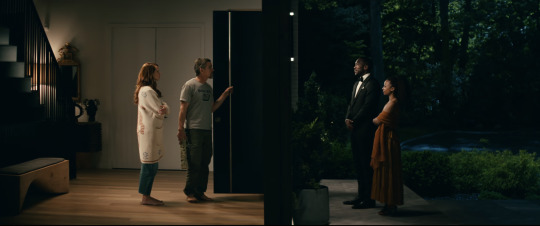
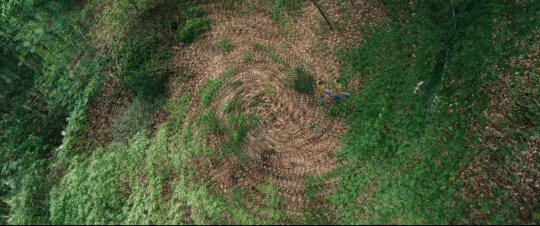
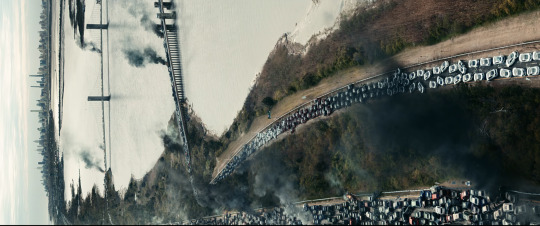
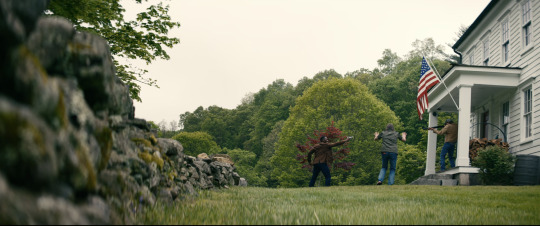
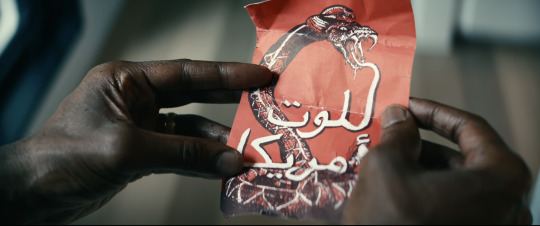
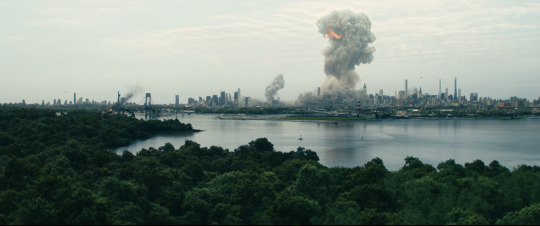
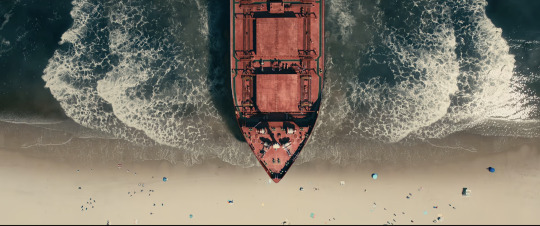
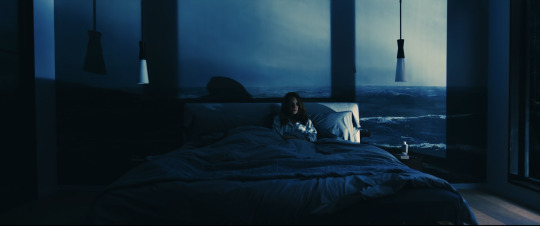
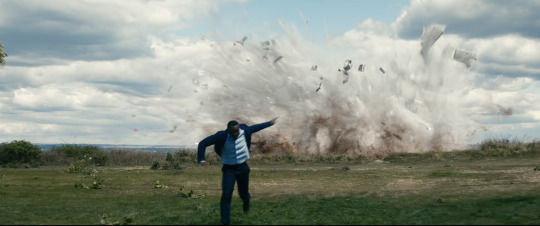
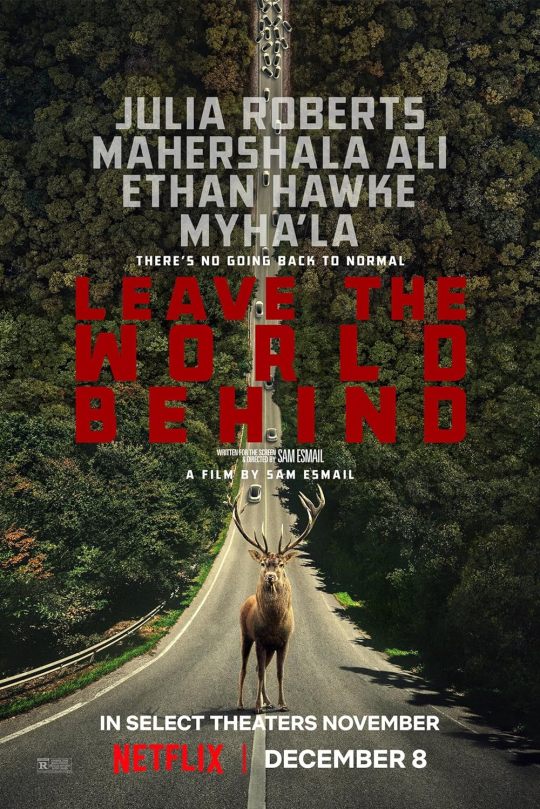
Leave the World Behind (2023)
Set in the modern day, the film follows the Sandfords. A family that takes a spontaneous trip from the city to upstate New York. They soon realize, that rash decision might’ve saved their lives. The U.S. is soon to be in the throes of a cyber attack from foreign adversaries. Drones are dropping leaflets on both seaboards that read “death to America”. Planes are falling out of the sky. Wild animals are congregating together to send a message to humanity about impending doom. With all that happening why does ‘Leave the World Behind’ feel so flat?
Most of this two hour + movie feels like we are watching these people on a lavish vacation instead of dealing with their country being attacked. The family rents a mansion for the weekend but the first night there is a knock at the door. Because of the blackouts in the city, George (Mahershala Ali) and Ruth Scott decide to come back home. This leads to a lot of animus from Amanda directed at the Scotts, which considering the circumstances really shouldn’t have been a big deal. They mostly sit and talk trying to piece together what might be causing all the service outages, for example. Lounging and waiting around when what’s happening in the world would seem to inspire more action to occur. Amanda Sandford (Julia Roberts) especially, but the film in general, is a lot of talk and little show. Her lines are full of exposition telling us what is going to happen, what she and they are about to do and it feels like Roberts is just reading lines. Mahershala Ali’s character was similar with the exposition but his character felt like a more real personality. The fault was mostly in the writing but the acting performances all fell somewhere on a scale from mediocre to great.
Amanda is a very confusing character and hard to like. She says she “fucking hates people” but also says she feels lucky to be part of the world where so many are out there making something of themselves. She constantly states her disdain and distrust in others, but contradicts herself at points in the film where she says she misses people. I know people are hypocritical and can change their minds but she comes off as an inconsistent character. For the majority of the film she is combative, unreasonable and on the back foot wanting desperately that others solve problems for her. And then in the third act Amanda delivers this monologue; “We fuck each other over all the time, without even realizing it. We fuck every living thing on this planet over and think it’ll be fine because we use paper straws and order the free range chicken. I think deep down we know we are not fooling anyone. I think we know we are living a lie. An agreed upon mass delusion to help us ignore and keep ignoring how awful we really are.” A description of humanity this discerning feels really out of place coming from her. This line and many others like it feel too scripted.
Ruth says Friends is a show “nostalgic for a time that never existed”. This is a scripted line that rolls off her tongue better seeing as Ruth is setup as a character that is socially and culturally conscious. She mentions this about Friends because Rose, Amanda’s daughter, is obsessed with the show. Rose finally gets to watch the series finale of her favorite sitcom when in the movie’s closing scenes she finds a fallout bunker with a grand collection of DVDs. I sort of found this ending to have a nice symbolism with Ruth’s context because as the bombs are falling outside, signifying the dark reality, Rose has one last chance to fall into that ideal, fictional world.
The Friends music, juxtaposed to the previous chilling scenes of NYC getting bombed, felt off. The soundtrack in total did not flow or sound like they were the right songs for the film. The choice of using up-beat hits clash with most of the imagery of a boring high end AirBnb get away.
The camera work is technically impressive at points where the camera traverses cars or rooms in acrobatic tracking maneuvers. The technique does get overused though. Are the multiple upside down shots supposed to signify how the world is being turned upside down? I suppose. Like the music I didn’t find these choices to fit well. Maybe they are both in effort to enliven the scenes introducing the film’s unstimulating setting. If so, either a change of setting or a change of style might’ve worked better.
It seems like the movie is trying to point out many different things about society without totally dissecting any of them. A few themes you notice while watching are; can we live without the internet, blissful ignorance of the decline of the empire, humanity’s cause of environmental collapse, selfishness vs selflessness. I agree with many of the ideas the film is alluding to, yet like many Hollywood movies today I don’t think it explores the ideas deeply or effectively enough. One of the more provocative things the film brings up is the idea that we are in part responsible for any attacks thrown our way.
Our government and military claims that all of its excursions around the world are defensive, but these things that they do in our name more than likely are at our expense. The U.S. empire leaves us less safe. “We’ve made a lot of enemies around the world. Maybe all this means is that a few of them teamed up.” This is the most interesting quote in the film where Danny (Kevin Bacon), the rural survivalist, points out different cues he’s picked up examining national affairs that led him to think we were susceptible to attack. The empire’s hubris allows it to believe it’s untouchable. We think we are safe, even George/G.H. (Mahershala Ali) mentions that he never thought ‘we’ could let this happen. As if multiple world powers have never allied together to stop a blood hungry empire an ocean away (and the U.S. is blood hungry, just look at our pursuits in Palestine, Yemen, Ukraine, Iraq, Vietnam, etc etc etc). I respect that the movie brings this up for American viewers to contemplate the vulnerable position we can be put in. Now, the harder pill to swallow that naturally should follow is the fact that as citizens we are not all just innocent bystanders. We have culpability for the machinations of the United States. We have agency to speak up in mass and change the actions our country takes, and still the majority of us haven’t. I suppose the Sandfords and Scotts are meant to represent the passive, oblivious, well-to-do, American family existing in an imaginary bubble of safety. Is everyone equally vulnerable though?
One among the many things that bugged me watching this was how it characterized the elite of the world. George repeatedly references one of his investor clients who is part of the “evil cabal that runs the world” /s. It is meant to be sarcastic but the client works in defense contracting so it’s not really. Because of his existence in the upper strata of society he was privy to the fact that shit was about to go down. So its inferred that the client was able to get away to safety. And G.H. says, in a weighty moment in the plot, “No one is in control, no one is pulling the strings. Sure there are those like my friend who might have the right kind of access to the right kind of information. But when events like this happen in the world, the best even the most powerful people can hope for is a heads up.” First, as if these powerful people aren’t the one’s creating the international disasters (ex; fossil fuel execs in the case of climate change or defense contractors in the case of Middle East invasions). And second, this paints the elite just as blue as everyone else. We know there are different rules for the rich and powerful in this world, so to pretend that they only have marginal advantages is laughable. Yes it’s hard to escape a country wide assault but some people can afford to be in a second home abroad or an underground bunker as we saw in the closing scenes.
Rating: 6/10
#movie review#movies#film photography#film#leave the world behind#2023#mahershala ali#julia roberts#ethan hawke#kevin bacon#myha'la herrold#empire#us empire#us imperialism#barbosafilm#movie poster#sam esmail#societal collapse
6 notes
·
View notes
Text

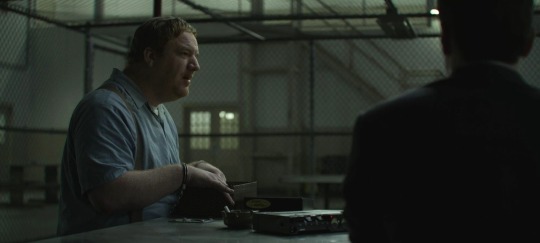
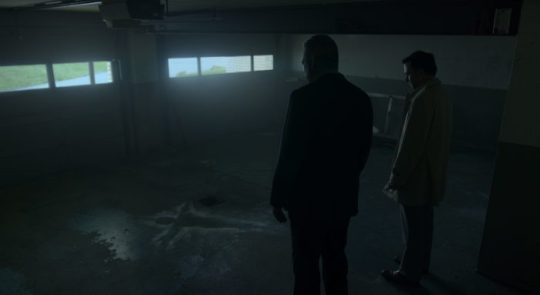
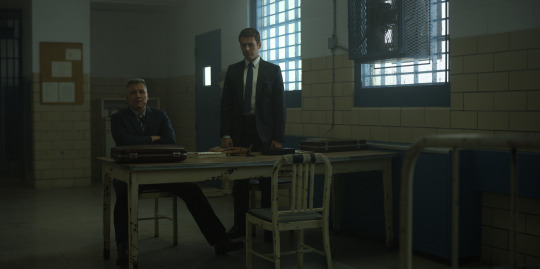
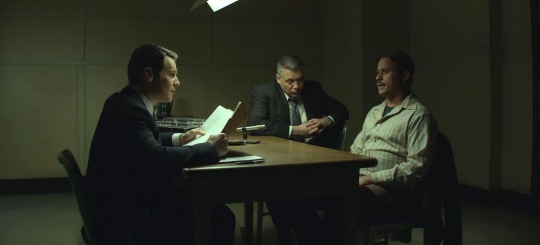
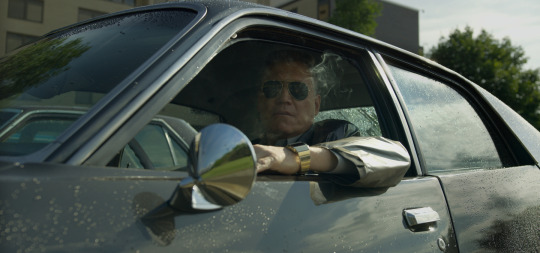
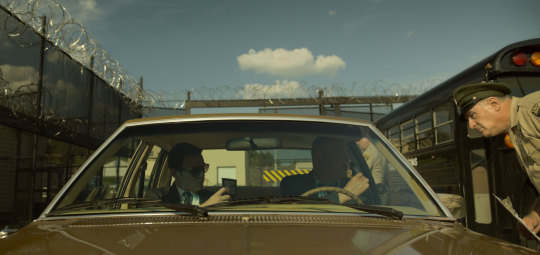
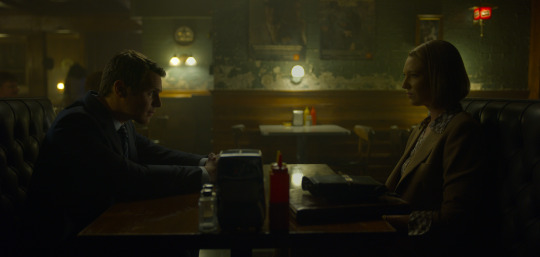
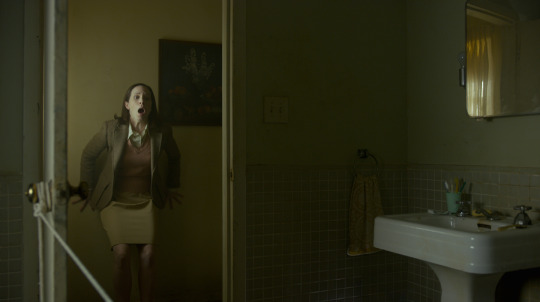
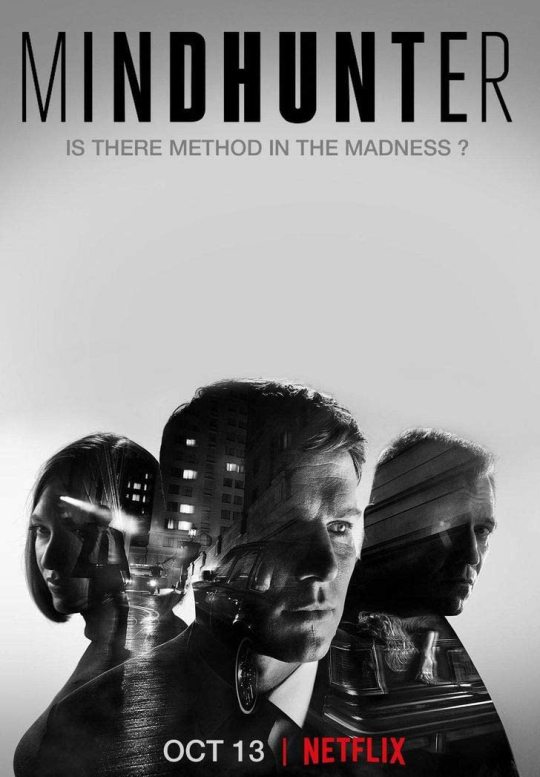
Mindhunter (2017)
Mindhunter is one of the best shows Netflix has ever put out. What sets it apart is its focus on human psychology, both criminal and civilian. Our FBI agent protagonists Bill and Holden try to scour the minds of serial killers through in depth interviews to better understand what made them kill. What led a human being into becoming what society deems a monster? The show and these interviews within it make you see the grey where society sees the black and white. These men (because they are mostly men) grew up usually with terrible upbringings that warped their world views and sent them onto dark paths. Not to say some wouldn't have become killers without the bad upbringings, because I believe sometimes its just somebody's wiring that sets them up for failure. The old 'nature vs. nurture' debate and which has more power inside of us. The phrase should be 'nature and nurture', because science says that we are all shaped by both. Mindhunter details that it's probably a bit of both too. The premise of the show is summed up best by sasisami on IMDB "Two FBI agents, fighting the departmental stigma of backroom boys - those who try to complicate the status quo of simple Means, Motive, Opportunity (MMO) of crime-solving with academics - work to develop an innovative investigative field incorporating psychology, anthropology and sociology as a method to reveal the motive. They acknowledge classic crime-solving - MMO - as no longer sufficient because criminality is becoming more complicated as Motive graduates from need and greed to inexplicable and irrational reasons. They theorize applying deeper psychological evaluation will posit new questions. Simply, asking Why will lead to the Who. This series focuses on the development by two men, two agents, of a new criminal field and does so through story lines of visiting the sociopathic mind." Agents Holden Ford and Bill Tench team up with psychologist Dr. Wendy Carr to start this Behavioral Science Unit. I love the way they portray the inception of the unit. All three are willing to take this huge career risk because of genuine curiosity and a belief that this new work can benefit society. Sure some are skeptical, mostly Bill Tench, but that doesn't dissuade them from doing the work. A lesser show would have more trivial storylines where the characters waste time fighting the objective or fighting each other, but the show focus's more on genuine dramas within the characters; like how their taxing work messes with their minds. Holden has panic attacks, Tench lets his family life suffer, and Carr well, she's relatively unfazed... for now. I predict she will have more to deal with when Season 3 eventually gets dropped (heres hoping).
Whats more, the show doesn't overly demonize these serial killers. There's no over-sensationalizing. It's because we get to see what shaped them; abusive families, absent parents, failure of support systems. You can't help but sympathize just a little. That's not every case though. Some of them are just as interesting because you see how inhuman a human can be. And partly why Mindhunter gives off such strong feelings is due to the amazing performances throughout.
The attention to detail in all aspects of making the show is what takes it from good to excellent. The casting is perfect whether it be for the main characters or the killers themselves. The slow striking score really sets the mood every time. An original score for a show always tends to give it that much more identity. Lighting, costume & set design, editing, everything. It made me decide that the next movie I watch has to be by David Fincher.
Rating: 9/10
#mindhunter#crime drama#movie review#movies#film photography#film#movie poster#film review#screenshots#murder#violent crime#homicide#cops#david fincher#anthrotographer#tv show review#Joe penhall#jonathan groff#anna torv#holt mccallany#hannah grose#serial killer#charles manson#edmund kemper#1970s#fbi
8 notes
·
View notes
Text


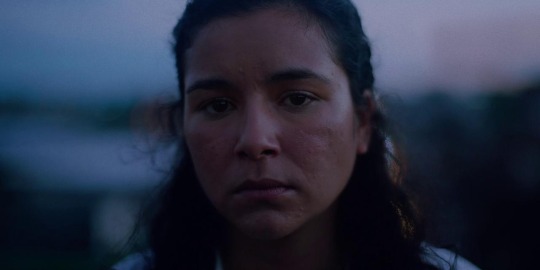
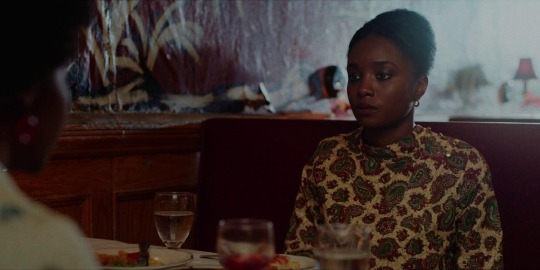
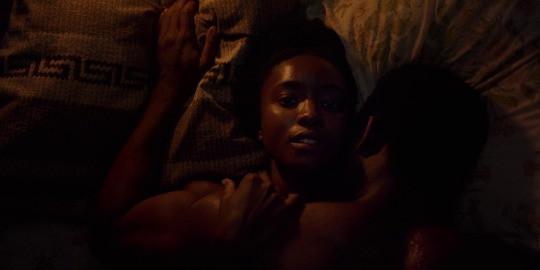

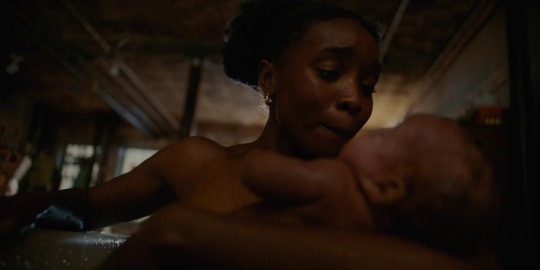


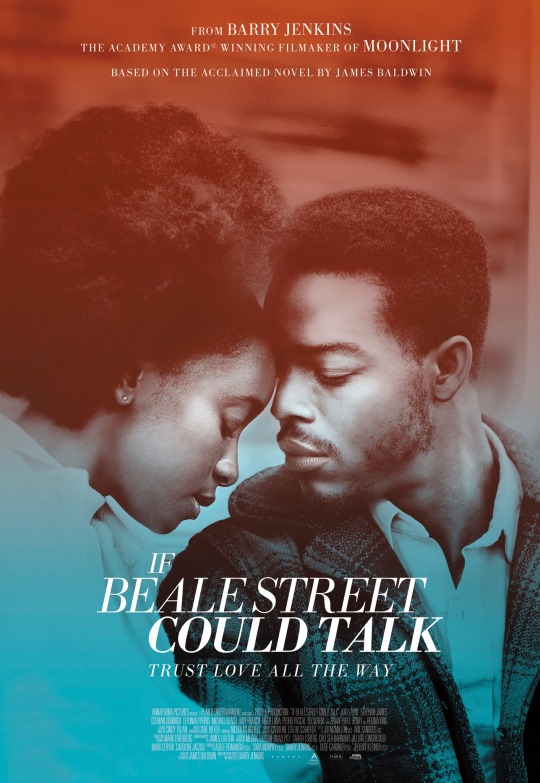
If Beale Street Could Talk (2018)
Thoughts on the film and novel. I read it before I saw it.
It's a different type of love story, one where the love is absolute. Usually you have a love story where one or more of the characters have to question "is this the one for me"? There is no room to question Tish and Fonny's love for each other. They have truly loved each other since they were kids. The real drama in the story is whether the world is gonna love them back and let them be together. Whether they'll get lucky or not, because it takes luck not to get fucked over by a system that excludes you. Will the racist, white-dominated society ever let up; and if not accept their existence, then at least be uninvolved/unaroused by it? No, they are aroused by it. The white men depicted in the film are just a reflection of reality in 1970s America and present-day. Their superiority complex is so baked into them by historical coincidence that many of them can't sit still nonviolently if a black person comes into their line of sight. And that's exactly the situation Fonny has to deal with in If Beale Street Could Talk. He was arrested by a white cop for a crime that he didn't commit, all because of his actual offense; walking home while black. It is as simple and cold as that. This might be James Baldwin's fictitious story but it's informed by a well sourced history of black oppression.
The big dilemma in the story is Fonny's imprisonment. To make matters more dire Tish informs her love that she is pregnant during one of her first visits at Fonny's jail. As stated before he was just minding his business one night when a cop decided Fonny fit the description for a suspect in a recent rape case. A young Puerto Rican woman was the victim of this heinous crime, but since it happened in the dead of night she didn't get a good look at who did it. The police department rounded up guys off the street and convinced young Victoria that Fonny was the one who did it. Part of the tragedy of Beale Street is the state pitting these two persecuted minorities against each other. The state has no 'real' proof to link Fonny to the crime. Unfortunately, as Tish's sister puts it in the book "We have to disprove the state's case. There's no point in saying that we have to make them prove it, because, as far as they're concerned, the accusation is the proof." Guilty until proven innocent. James Baldwin would probably be depressed but not surprised to find out not much has changed about the justice system in America.
What I find most gripping is the realness of the characters. Not just the young adults Tish & Fonny, but their families too. Tish's family has a crude vocabulary and domineering attitude towards anyone not in their corner. They, like many in their community, are jaded by the world they grew up in. They are just finding ways to cope and not explode. Not explode just for their families sake. For Fonny and the baby's sake. They love one another and to them that means speaking uncomfortable truths, like holding no punches when talking about the sins of white people. And sins not in the religious sense because their family justifiably has lost faith in any grand fairness that religions so often preach. Fonny's biological 'family' on the other hand drinks the Christian cool-aid hard. Well his mother and sisters do. They don't see Fonny's incarceration as an injustice, but as a consequence of his impurity. Impurity of having a child so young, marrying so young, not being pious enough, etc etc. The only family member that truly supports him is his father Frank. Baldwin is showing us through his characters that we're all imperfect. We are products of our circumstances and environment, like the wood Fonny crafts into sculptures. What perfect symbolism by Baldwin.
The innocence of this couple's love is something that really comes through in both the screen and the original novel. I did feel the film relied too heavily on its long silent stares between the protagonists. They're meant to evoke a love that is so powerful it needs no words, but after a while these scenes get too tedious and uninteresting. I think the film adaptation kept close to Baldwin's work though, but since I inevitably compare it to the novel I just feel it came short of being as powerful. Part of it could be just simply that this is James Baldwin’s story, not the director Barry Jenkins' original work (Like Moonlight was, and which I think is a 10 of 10 film). There was however one semi-big detail the film didn't adapt, and that's the presumed suicide of Fonny's father at the end of the drama. In my opinion that omission is very significant. It softens the power of the story. A thought I think now that describes the film overall. Jenkins himself hints at at in an interview with IndieWire that his film was more about the love story. I think Baldwin's original story is about hurt, hurt, and more hurt with love trying to survive it all. And Fonny's father committing suicide after facing the fact that his son is not getting out of prison is a crucial moment of that hurt. Baldwin obviously thought it was crucial because it’s literally the last thing that happens in the book. Presumably Baldwin's final reminder that historically a black life in America never really gets a happy ending.
P.S. My comments ended up being more on the book than the movie because at the moment that I'm writing this I recall the book more.
Also I thought the soundtrack was great and stood out as one of the best things about it.
https://www.indiewire.com/2018/11/if-beale-street-could-talk-barry-jenkins-james-baldwin-1202023517/
Rating: 6/10 (Just the film)
#anthrotographer#movie review#movies#film photography#film#movie poster#film review#screenshots#if beale street could talk#james baldwin#1970s#black film#based on novel#books and novels#black history#book vs movie#kiki layne#stephan james#regina king#nicholas britell#film music#fonny#tish
10 notes
·
View notes
Text







Old (2021)
Dir. M. Night Shyamalan
I was pretty disappointed by how this movie turned out. I remember being enticed by the trailer a year or two ago. Finally I ended up getting around to it and I would've been better off staying away. The concept is interesting enough; (Spoilers) some people are stuck on a beach with minerals that have metaphysical quick aging properties. Every hour equates to two years of aging. And everyone kinda realizes too late that they are part of a fucked up pharmaceutical drug experiment thats testing the effectiveness of potentially life saving drugs on them. Old had potential to be a compelling and sinister film, but in so many ways felt weak. The acting, for instance, was so weird. So many performances either felt emotionless, off beat, or completely over the top. I can't blame the actors completely because the acting direction could've been wack and they were given D tier dialogue. Also, these people made such unrealistically stupid decisions just in an effort to move the plot forward. I think that if this premise was written with more love all around it could've been way better and had something cool to say. The whole Big Pharma using us as Guinea pigs thing can work. At the end of the movie you're meant to feel a little bit torn on whether it was worth sacrificing a few people if it means saving millions with a successfully tested drug. All these people that were coerced onto the beach had been secretly fed test medicines to treat their varying life threatening diseases. I might've felt more conflicted if we got a sense of the toll their diseases had on them, throughout the first two acts. But that wasn't really depicted well. Also the logistics of this whole experiment were a bit too flimsy. I know we are dealing with an already unbelievable concept but I think if you take one far fetched idea and then build a realistic world around it, that's makes for the best fictional stories.
Rating: 4/10
#old 2021#horror#thriller#beach vibes#m night shyamalan#gael garcia bernal#vicky krieps#alex wolff#rufus sewell#thomasin mckenzie#nikki amuka bird#aaron pierre#barbosafilm#movie review#movies#film photography#film#movie poster#film review#screenshots#horror movies
19 notes
·
View notes
Text




Nadie Sabe Que Estoy Aquí (2020)
Dir. Gaspar Antillo
Nobody Knows I'm Here is a soft and artistic Chilean film about a soft and artistic main character. Examines the effects of trauma at a young age and how that can lead a person to being reclusive and standoffish. Well, a mixture of traumatic experiences and dealing with the stresses of celebrity at a young age have that consequence on the protagonist; Memo. Because of the things he dealt with in his past life Memo has shut himself out from the greater society. Now living on an isolated sheep farm with his uncle, his days are depicted as quaint and lonely. He hardly even talks with his uncle, but there's obvious love there on both sides. Memo still has visions about being a singer. These are dark and melancholic scenes that entrancingly give us a picture into Memo's dolor. You have to feel for him. No one really understands his state because it's such a singular experience. I won't spoil the interesting nuances of the plot that make this film really unique. It's definitely worthy of checking out.
Rating: 9/10
#nadie sabe que estoy aquí#nobody knows I’m here#Gaspar antillo#jorge garcia#Lukas Vergara#millaray lobos#chilean#Chilean film#barbosafilm#movie review#movies#film photography#film#movie poster#film review#screenshots#netflix
1 note
·
View note
Text










The Artist (2011)
Dir. Michel Hazanavicius
An ode to the silent film era and reminder about the tense transition period to Cinema with Sound. Our star George Valentin was so used to being seen. The character is always smiling for the cameras. Until Hollywood casts him aside for younger talent, willing to use their voices. It hurts Valentin even more to know that his young protege/fan girl, Peppy Miller, is one of L.A.'s new starlets. He's lucky Peppy truly cared about him because she was there for him in his truely darkest moments.
What I found interesting is that even though George Valentin was suicidal and attempted to end it multiple times, the film never really got 'dark'. The overarching mood for the drama was not inconsequential, but light. Like a show. And thats I think part of the desired effect. One of the popular tropes of the silent era was the happy ending. A lot of those films lacked a realism that became more popular in film as time went on. I thought The Artist could've been more interesting if it allowed itself to get 'dark' by modern standards and sort of flip the trope on its head. But I recognize the beauty in being faithful to the genre.
The Artist is for those who cherish the pictures from the silent era; film snobs. Thats not meant in a demeaning way, it's just that to the casual movie watcher this one can be quite sleep inducing and anticlimactic. Some like me might be expecting a twist to come that turns the movie midway into a talkie, but no. Not exactly.
Rating: 7/10
#the artist#the oscars#Michel hazanavicius#jean dujardin#berenice bejo#john goodman#james cromwell#Penelope Ann Miller#missi pyle#barbosafilm#movie review#movies#film photography#film#movie poster#film review#screenshots#silent film#black and white#film history
9 notes
·
View notes
Text








The Ritual (2017)
Dir. David Bruckner
Never go off trail! At least for beginner hikers. That was one of many mistakes this band of brothers make while on 'The King's Trail' in Sweden. They should have stuck to one route and committed to it, but it's easy for me to say sitting at home. In actuality every action, piece of dialogue, and performance was extremely believable. The set up to get these adult friends into the harrowing main plot is captivating and excellent film exposition.
The Ritual is a study on guilt. Specifically Luke's guilt from from not backing up his old mate during a mugging that ended fatally. That guilt incarnates into a physical nightmare that forces Luke to confront it. Will he be crushed by it, or right his wrong and try to save his friends still living? It's "four twats in a forest" versus a Norse mythology hell-spawn. Who wins?
This film reminded me of Midsommar in quite a few ways actually. Foreigners who faced recent tragedies take a trip to Sweden only to find themselves caught in a death cult. Like with Midsommar, The Ritual could be pretty funny at times. It wasn't as terrifying though, but pretty unnerving. All told, The Ritual on its own is an absorbing experience well worth a watch.
Rating: 8/10
#barbosafilm#movie review#movies#film photography#film#movie poster#film review#screenshots#horror#horror movies#norse mythology#sweden#the ritual#david bruckner#joe Barton#rafe spall#arsher ali#robert james collier#sam troughton#paul reid#mystery#midsommar
9 notes
·
View notes
Text










Vertigo (1958)
Dir. Alfred Hitchcock
Saying nothing of the plot or characters of Vertigo, what I truly was paying attention to were the shots all around San Francisco. The city imagery looks so ideal it’s reminiscent of the city’s postcards.
I wanted to watch this because it’s a classic, but mostly because I plan to take a trip to the Bay Area soon and wanted to see films that were set their.
Read this review after watching. It says something interesting and insightful about the film that I couldn’t.
Rating: 6/10
https://www.rogerebert.com/reviews/great-movie-vertigo-1958
#barbosafilm#movie review#screenshots#movies#film photography#film#movie poster#film review#vertigo#alfred hitchcock#james stewart#classic film#san francisco#mystery#love obsession#kim novak
19 notes
·
View notes
Text






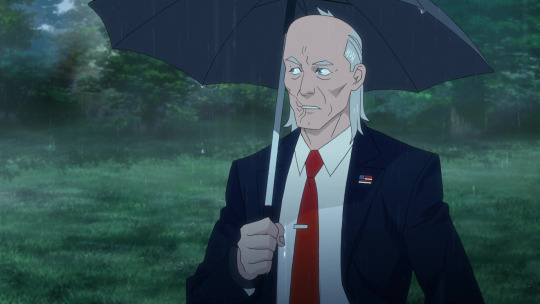


Invincible (2021)
By Robert Kirkman, Cory Walker, & Ryan Ottley
I’ve seen a few super hero stories that do the whole; “What if Superman was evil” thing, but this was “What if Superman was evil… and he had a son?” It’s funny because there’s not much of a difference, but the greatest thing about Invincible in my opinion is the dynamic between father and son; Omni Man and Invincible. A son wanting to be just like his super dad only to find out later that his father is a monster. It speaks to a real thing that happens in paternal relationships when children realize their ideal of what an adult should be is shattered when they learn the flaws of their parents. There is a lot of confusion and heartache that proceeds and I’m guessing Season 2 is going to go into that journey for Mark Grayson.
There is an incredible danger with an all powerful “super hero” like a Superman, Omni Man, Homelander, etc… if they break bad it’s over for humanity. A superiority complex over humans is a real danger to watch out for. That’s why Batman (in the Justice League animated series) keeping contingency plans on how to defeat every member of the JL was a smart idea. We are like ketchup packets to the Supermen breed. It doesn’t make sense to trust them whole heartedly, even when they choose to be the almighty protector of society.
Rating: 8/10
#barbosafilm#movie review#tv show review#tv#superhero#invincible#omni man#robert kirkman#cory walker#ryan ottley#steven yeun#jk simmons#sandra oh#zazie beetz#grey griffin#walton goggins#gillian jacobs#zachary quinto#violence#screenshots
80 notes
·
View notes
Text







Knock Down the House (2019)
Directed by: Rachel Lears
Amy Vilela
Alexandria Ocasio-Cortez
Cori Bush
Paula Jean Swearingen
The stories of these four women are touching. I got teary eyed not gonna lie. To see people fighting for what is right and risking a lot to do so demands incredible respect. Knock Down The House shows that the fight to upset the political establishment and win is incredibly hard...but it’s doable (at least on the small scale, remains to be seen on a large scale). The political system in the U.S. is anti democratic for so many reasons, one being that grassroots candidates like AOC have so little chance of winning in these races. The built in fundraising lead that incumbent Democrats have makes it nearly impossible to overcome. But that doesn’t mean we shouldn’t try.
Rating: 10/10
#knock down the house#aoc#politics#progressive#barbosafilm#movie review#movies#film photography#film#movie poster#film review#cinematography#director#screenshots#documentary
12 notes
·
View notes
Text
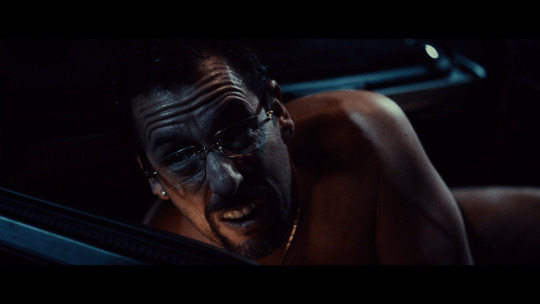









Uncut Gems (2019)
Directed by: Josh & Benny Safdie
The building of intensity and anxiousness is the strength of this movie. Everything from the camera work to the soundscape are manipulated purposefully for this effect. A few times the music crescendos over moments of actions and even dialogue. You kind of can't hear parts of the dialogue over the loud music, which adds to the 'wtf is going on' factor. Early on when we are getting a lay of the land of Howie's (Adam Sandler) world there's music playing that sounds similar, if not, inspired by the opening music of Akira. It gives off an expansive, gritty, and abstracted feeling. Disrupting music, over-the-shoulder shots, close-ups added to the already chaotic action make Uncut Gems a fun anxiety inducing experience.
What can add to a movie’s appeal too is the realness of its characters, and everyone in Uncut Gems felt like a real person you could meet on the street, with their own unique rough personalities. Every character was awesome; Howie, Arno, Julia, Demany, the Goons, Howie’s family, and even Kevin Garnett who yes played himself, but it’s still impressive seeing as he’s never acted before.
Howard is an interesting character even though he has close to no redeeming qualities (he's at least charismatic). He is an impulsive gambler who’s putting his family’s safety at risk, he cheats on his wife, and he’s an absent father. Yet you’re kinda invested in him. His biggest pitfall is that he’s addicted to the rush. One of the best scenes of the movie shows this. Kevin Garnett just payed Howard for the stone and Arno and his goons are outside the office expecting to be payed with that money. Howard is so lucky because he was essentially dead if he didn’t have the money by the time they came around, but Howard just can’t help himself; he wants to bet it all on KG. He starts talking up KG about Game 7 and how the Vegas odds have him loosing the game. He says something like ‘They don’t think you’re going to show up in Game 7, let’s show them that’s what we do, we score big when our backs are against the wall’. Howard’s not just hyping up KG, he’s hyping himself up too. That rush of that big pay off is what he lives (and dies) for.
Rating: 9/10
#uncut gems#safdie brothers#adam sandler#julia fox#kevin garnett#lakeith stanfield#idina menzel#the weeknd#eric bogosian#barbosafilm#movie review#movies#film photography#film#movie poster#film review#cinematography#director#screenshots#actors#anxiety inducing#jewellers#gambling
20 notes
·
View notes
Text
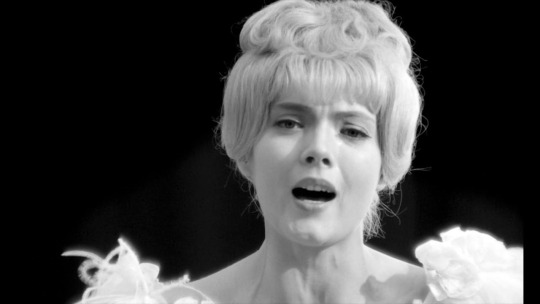
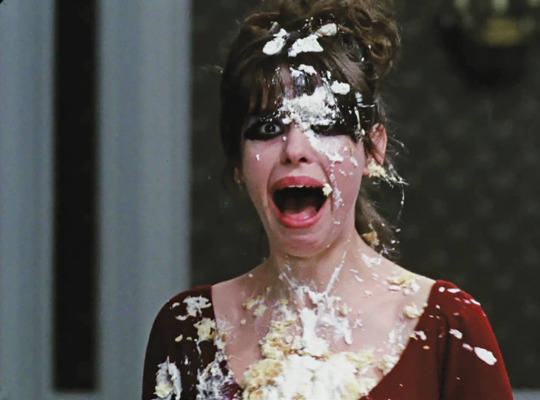
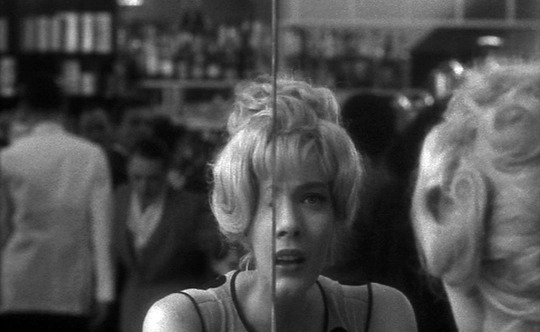
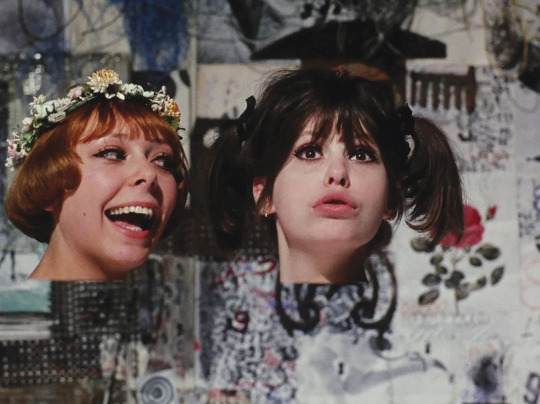
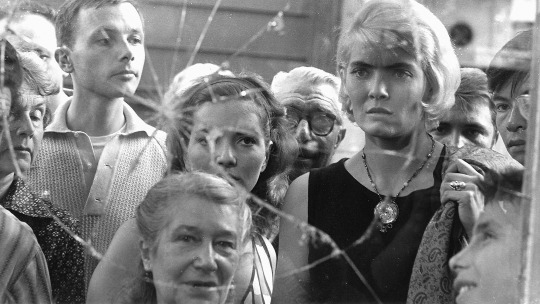
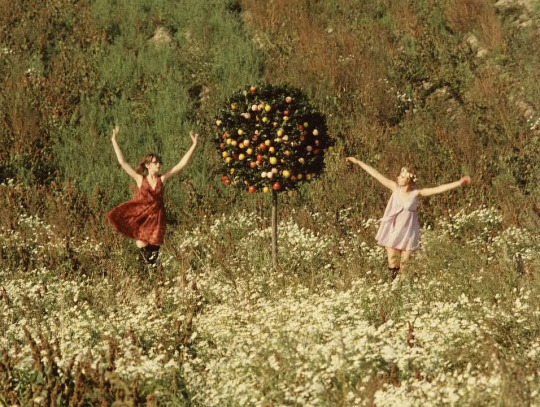
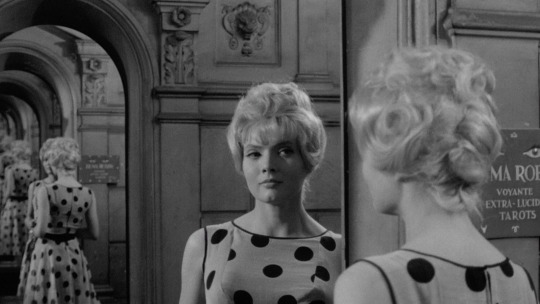
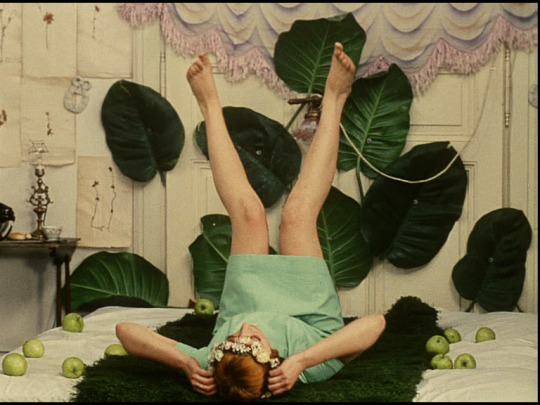
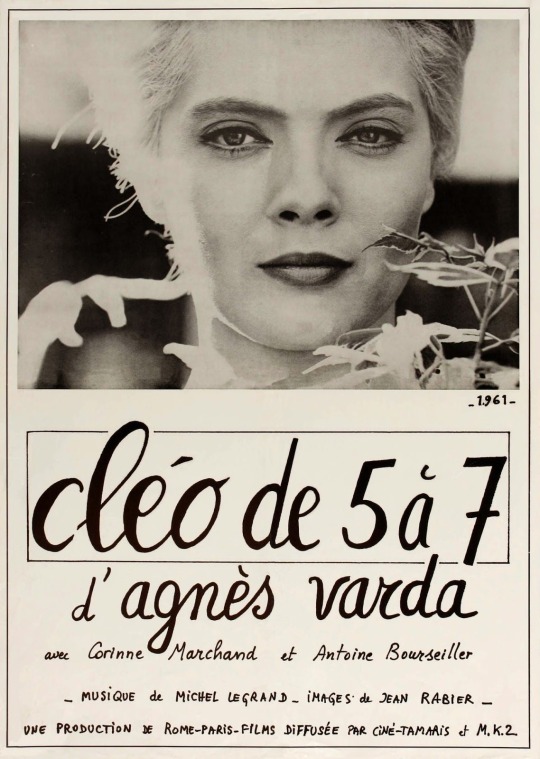
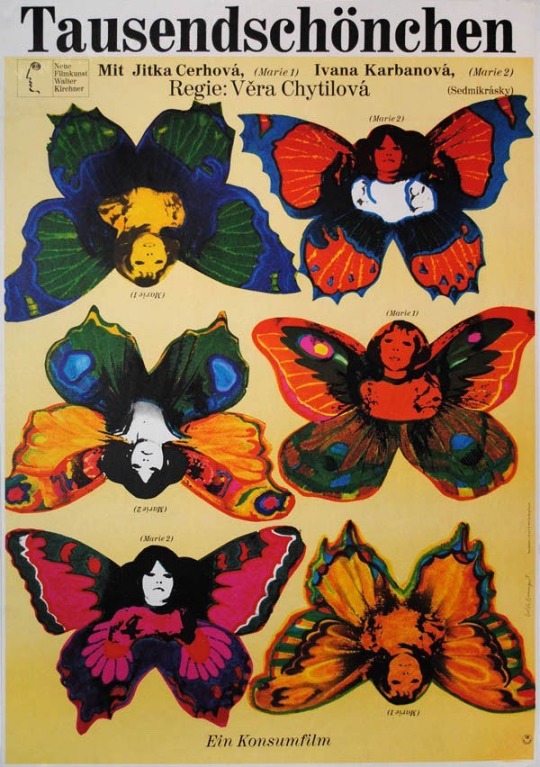
Cleo from 5 to 7 (1962)
Directed by: Agnès Varda
Daises (1966)
Directed by: Věra Chytilová
Sorry for the long scroll. This is an essay I did for a class about a year ago. It was on two women directed foreign films Cleo from 5 to 7 and Daises. In the paper I get into a lot of the similarities between the films and what they do well, but I don’t get to really give my opinion on them. Both the Czech Daises and French Cleo are wonderfully unique. Daises was chaotic, fun, and plotless. I really had to work to eek out some meaning from that one. Cleo from 5 to 7 caught me by surprise of how much I loved it. It’s one of the best films I’ve ever watched. I don’t always judge films objectively like I ought to. Usually if there is an extremely stuck up, narcissistic lead character in a movie it turns me off. I’m not really interested in seeing personality types like that. Cleo from 5 to 7 breaks through for me though. The evolution of Cleo’s character is based so much on real experiences that I find it to be such a truthful story, with layers of weighty symbolism.
———————————————————————
The Timid Cleo and the Bold Daises
Through the Nineteen-sixties feminist movements could be seen sprouting all across the globe. The art, music, and filmmaking alike from these periods captured and spread these feminist ideals. Agnes Varda in France and Vera Chytilová in Czechoslovakia were women film directors who made films with women’s issues in mind. Varda’s Cleo from 5 to 7 is a slow, plot driven drama that follows, as David Cook puts it, “the life of a young pop singer who is waiting for a lab report that will tell her whether she has cancer” (Cook 370). Vera Chytilová ’s Daises appears to be a plot-less comedy headed by an anarchic female duo. Both films were made in patriarchal societies and appear to take place in them. The two films explore how their women protagonists deal with being seen as objects of beauty in these male dominated worlds. Cleo struggles with finding her self-worth outside of her superficiality and feels like maintaining her beauty is tied to that self-worth. Marie I and Marie II in Daises inversely have no questions about their self-worth and use their objectivity to their advantage. The Maries thus have less evolving to do in comparison to Cleo who’s journey it is to detach her pride from her beauty.
Cleo wallows in fear as she awaits the results of her biopsy. Everyone she would consider “close” to her, like her assistant, her boyfriend, and her pianist seem uninterested in her troubles or are unwilling to give her a comforting ear. That is until Cleo meets up with her old friend from art school, Dorothee. After a stressful day Cleo heads to the sculpting studio where Dorothee works as a nude model. As Cleo walks into the studio the camera appears to give us a first person shot from Cleo’s perspective. It’s a slow, apprehensive moving shot into the room where the sculpting is happening, giving us the feeling that Cleo is uncomfortable with what’s happening. Then we see Dorothee posing naked still in the middle of the class and she meets eyes with Cleo. She does not appear embarrassed in the slightest, on the contrary she is excited to see her friend. Cleo waits for Dorothee to finish her shift and get changed so they can walk out together. We learn as they talk that Cleo was in fact uncomfortable in the studio as she tells Dorothee that she would be “afraid people would find a fault” if that was her. Dorothee responds with one of the most profound quotes of the film and one that seems to stick with Cleo. Dorothee says “my body makes me happy, not proud” meaning that she can be happy about the way she looks without having her self-esteem or pride being affected by it. Through the first half of the film Cleo had been overtly concerned about her disease possibly affecting her appearance. This is exemplified by her constantly checking in mirrors to see if she is still pretty. It appears that to Cleo her beauty and fame are all she is good for. She sees herself through the patriarchal lens. For example, Cleo’s never present boyfriend shows up to her apartment for a quick chat in which he avoids the topic of her sickness and extols upon her beauty for five minutes until he leaves. Also, a few minutes later Bob, her pianist shows up and jokes about how he’s attracted to her because of her money. The possibility of a cancer diagnosis forces Cleo to start thinking the way Dorothee thinks. Allison Smith writes about Cleo’s cancer that “Her knowledge of its existence therefore obliges her to see herself differently, to take account of her own awareness” (Smith 97). This focus on the world outside of herself helps her find someone who actually cares about her and not just her good looks. That person is the soldier Antoine. Even though he finds her beautiful that is not the only aspect of Cleo that he is invested in. He cares about her health; the only other character in the film besides her longtime friend Dorothee that truly worries about her diagnosis. Cleo ultimately finds solace in the fact that she has made a real, non-superficial relationship with another human being. The protagonists in Daises also are involved in superficial relations, yet they do not perceive them as negative the way Cleo does.
The two young woman named Marie who headline the film Daises have no qualms about being objectified. Like Cleo, everywhere they go, they capture the gaze of men. The Maries are comfortable within themselves enough to use their beauty as a tool for their own benefit. From the outset of the film the girls exclaim that they intend to spoil themselves, so using men for free dinners and then dropping them like used napkins afterwards naturally follows. One such occurrence happens in a scene where the red headed Marie is over at the apartment of some butterfly collecting pianist. The man creepily exclaims his love to her through a poem while Marie poses nude for him. He calls her Julie, giving us the impression that Marie gave him a false name, just like the Maries do with all the men they meet. Handing out false names shows the lack of commitment and respect they have for the men they toy with. Once Marie starts to put her bra back on, the pianist gets angry and says, “I wish you’d never come into my life!” Marie knows exactly how to play him though and the next thing he sees is Marie holding two framed butterflies over her exposed chest. The man completely reverts back to exclaiming his love for “Julie”. Marie uses this opportunity to ask for the one thing that the Maries always want, food. Women overeating is just one of the patriarchal taboos that Daises flips on its head.
The characters of this film go against the traditional patriarchal ideals of what women should be. Women are used to having their beauty be used against them and for the pleasure of men, but in Vera Chytilová ’s film the Maries use their beauty against men and for the pleasure of themselves. Traditionally women also have been forced into the submissive role in society, where they have to keep themselves composed and presentable constantly. To the Maries that is not even a thought that crosses their minds. They do not adhere to being the submissive ones, in fact they control the dialogue and direction of every interaction with men in the film. Laurel Harris seems to agree with me when he writes “…the Maries’ hysterical excess is a calculated response to inadequate roles in their society for individuals of their age and gender” (Harris 4). The duo also does not worry about seeming composed or mannerly when scoffing down pastries and appetizers in crowded restaurants. In antiquated gender roles women are made to watch how much they eat so they can maintain their figure, but at dinner with one of their suckers, one Marie asks the man “Are you on a diet?” I agree with Peter Hames assessment of Daises’ conception when he writes “Since women have been excluded from productive behavior, they have turned to art and play” (Hames 87). Hames is saying that Vera Chytilová ’s film is a reaction to woman being controlled for far too long. Whether Chytilová set out to make a feminist film or not the end result for Daises is a film that does not judge its non-conformist female characters.
Cleo from 5 to 7 is more explicitly set in a male run society. Agnes Varda created a character in Cleo that starts off fully invested in that societal structure. Her happiness is tied up into her superficial being, but because of the cancer she is forced to take account of what truly is meaningful in her life. She starts to crave caring relationships with people who recognize her for more than just being a pretty pop star. Cleo finds the power within herself to break out of the caged existence of women in a male dominated society. Cleo at one point in the film rips off her wig and gives away her fashionable hat; two symbols of conventional female beauty. Cleo from 5 to 7 and Daises both represent women’s lives in these feministic ways.
The two women filmmakers Agnes Varda and Vera Chytilová end up making similar films in that they have themes of women empowerment. Yet, the way in which its illustrated in each film is drastically different. Chytilová’s Daises wastes no time in showing the viewer that women can be unapologetic anarchists. There is no preconception of womanhood that the Maries have to fight to overcome. They just are empowered women. Cleo from 5 to 7 shows the evolution that a particular woman has to make to escape from seeing herself as just an object. These films helped inspire a generation of women in not conforming to typical patriarchal standards.
Works Cited
Cook, David A. “Chapter 13.” A History of Narrative Film. W.W. Norton, 2016.
Hames, Peter. “The Golden Sixties: The Czechoslovak New Wave revisited.” Studies in
Eastern European Cinema, 2013.
Harris, Laurel. “Czech New Wave Cinema: The Children of Marx and Kafka.” PopMatters, PopMatters, 30 Mar. 2002.
Smith, Alison. “Agnes Varda.” Manchester and New York, Manchester University Press, 1998.
#barbosafilm#movie review#cleo from 5 to 7#agnes varda#daises#věra chytilová#french film#czech film#feminism#feminist film#women in movies#women in film#female lead#movies#film photography#film#movie poster#film review#cinematography#director#screenshots#jitka cerhová#ivana karbanová#corinne marchand#1966#1962#michel legrand#French feminism#movie stills#film reviews
123 notes
·
View notes